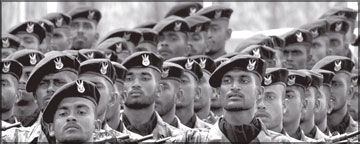That edge, in diplomacy
Dilshan Boange
One of the foremost expressions of a country’s sovereignty in the
realm of ‘internationalism’ would be its ability to successfully conduct
foreign relations with other sovereign countries without being subject
to the direction of an external entity. The manner in which a government
approaches the subject of foreign relations will give indications of how
its ‘diplomacy’ is formulated. Post-war Sri Lanka has seen notable
emphasis on means and measures being explored to equip and execute
effective ‘diplomacies’ to meet the needs of the plans being mapped out
by the present government under the direction of the Mahinda Chinthana
manifesto. I use the term ‘diplomacies’ since the many facets of foreign
relations require different approaches be devised by a government
depending on the needs of its national programme.

Defence diplomacy is one such avenue on which relations between
countries can be strengthened. The regular training scholarships granted
to military personnel to the Sandhurst Royal Military Academy in UK and
West point Military Academy in USA are examples just as much as joint
military exercises and goodwill visits can also be seen as routine
functions of a country’s defence diplomacy in practice. In the recent
past conferences and forums held under the auspices of the present
Defence Secretary that attracted notable overseas participation to learn
from the Sri Lankan Armed Forces on the strategies devised to defeat a
militia that practiced jungle based guerrilla warfare can be seen as
defence diplomacy developed with more specific objectives contextualised
within a specific government plan and policy integrated to the larger
policy of foreign relations taken in the broader spectrum.
University programmes
Effective trade diplomacy is perhaps quite a need of the hour to meet
the present government plans to address economic needs of the people and
to serve as a mechanism to help the government reach its development
objectives in partnership with friendly States. When dealing with
international bodies like the World Trade Organisation what a government
needs in my opinion, in the context of trade at an international level
of dealing, are persons who are equipped with expertise that should
include current up to date knowledge on the subject and the structural
functioning of the organisation within whose forums they are required to
‘play the game’, effective negotiation skills as well as the ‘finesse’
that characterises the quintessential ‘trained diplomat’ whose poise and
amiability would contribute favourably in the process of interpersonal
communication.
|

Security Forces personnel |
Effective machinery to carry out successful operations in the sphere
of diplomacy may come at a rather handsome price. But it is in my
opinion an investment that a government must make in its path to a
holistic development of a country’s image and capacity, to successfully
engage external parties, be they sovereign States or international
bodies. In this context of ‘investment’ what I would opine is strategic
expenditure to enrich the ‘human capital’ which puts into action Sri
Lanka’s foreign relations on a daily basis.
Academically speaking the subject of International Relations does not
equate to the subject of Diplomacy. To the best of my knowledge the only
Masters in International Relations is offered by the University of
Colombo. When it comes to degrees in Diplomacy Sri Lanka is yet to
develop one at either basic degree level or at the level of graduate
studies.
To the best of my knowledge, one of the very best university
programmes in Diplomacy available today is offered by the Fletcher
School of the University of Tufts in Boston, USA. Their Master of Arts
of International Law and Diplomacy (MALD) is one of the most competitive
in the world. Sri Lanka’s External Affairs Ministry will no doubt
benefit immensely if for a certain period of time a young candidate or
two from the diplomatic corps could be selected successively for several
years to be enrolled through a government funded scholarship in
programmes of the calibre of the MALD of Fletcher School in order to
build up a cadre that would eventually be in a position to develop an
internal training unit for future career diplomats. Our larger academic
fraternity too would benefit immeasurably with new cutting edge
knowledge tools entering university curricula through such qualified
persons if given the opportunity to impart their knowledge as visiting
lecturers in perhaps graduate studies programmes.
International languages
Another focus area to invest to better our arsenal in the diplomatic
corps would be to streamline young members of the Foreign Service into
groups for specialisation in some key international languages. Sri Lanka
is generally comfortable viewing the world through an Anglophone window.
But the importance of diversifying and developing specialist expertise
in linguistics to enrich our External Ministry’s human capital forming
the Overseas Service cannot be overstated in my opinion.
There is a principally Spanish speaking world to which belongs the
Latin American quarter abundant with vast natural resources. There is a
Francophone world as much as an Anglophone one.
There are some notable efforts underway to build Afro-Lankan
solidarity under the auspices of President Rajapaksa at present. And
what may be food for thought is that a significant number of African
countries are former French colonies which would form part of the
francophone world. As to whether there is yet, linguistically speaking,
a ‘sinophone’ world, I do not know, but the need for fluent mandarin
speaking Sri Lankan diplomats may become evident in the near future.
And, for a diplomat, one of the primary tools needed in his trade is
effective speech and language skills.
A country’s ‘public face’ in the context of globalism can be
dependent on the machinery available to effectively carry out the tasks
of the External Affairs Ministry. Futuristic, investments made today to
enrich the human capital that puts into effect our foreign policy at the
level of planning and implementation will, in my opinion, yield immense
dividends for our country, and surely carry Sri Lanka towards
unprecedented heights of development. |





